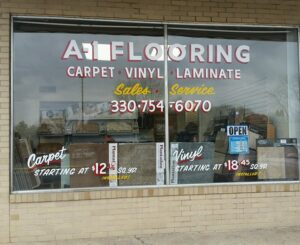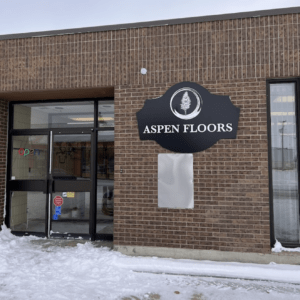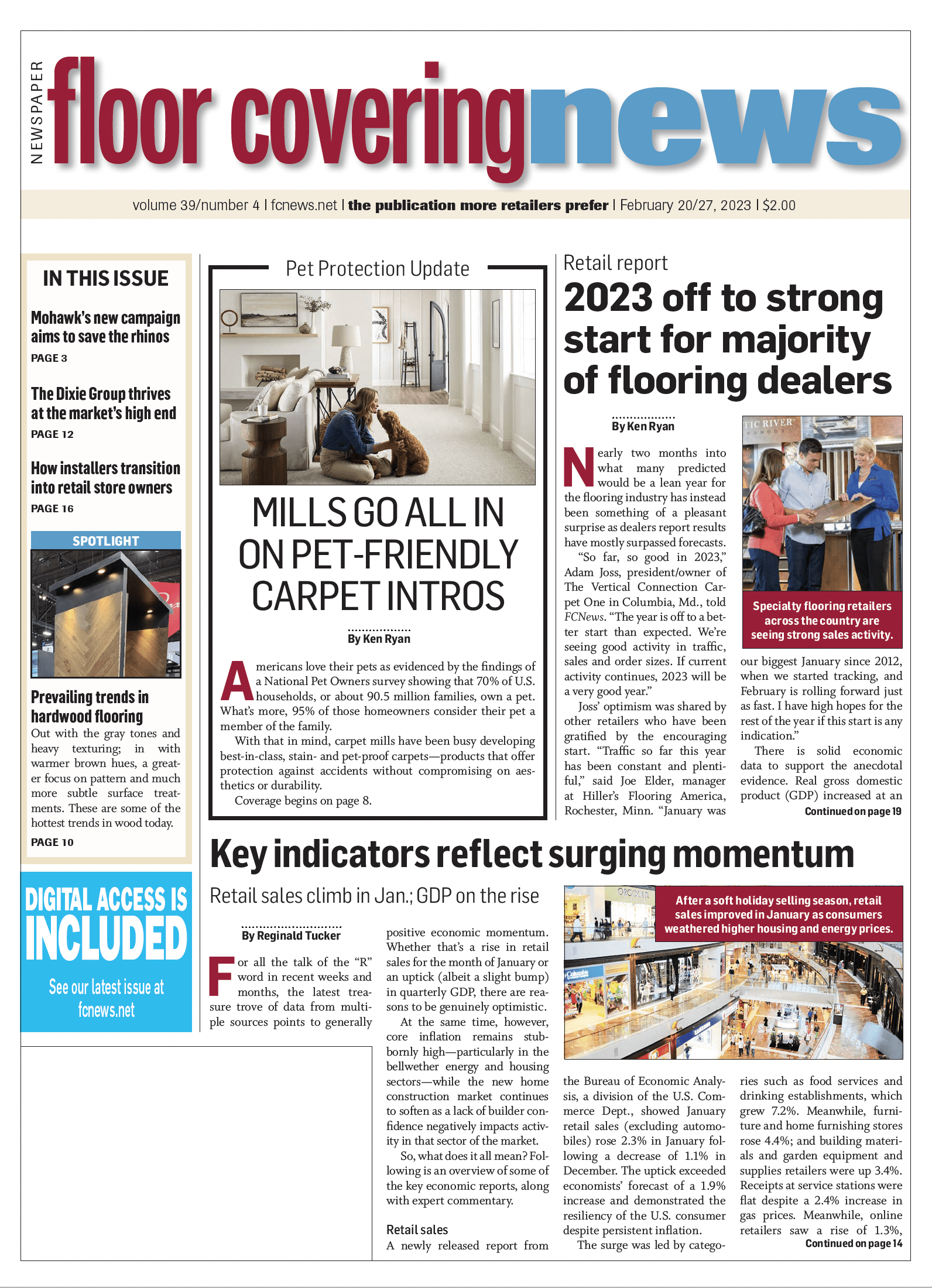Opening a small business is no easy feat—no matter what you’re selling. When it comes to flooring, it takes a lot of expertise and a little bit of guile to run a successful business. Not only do flooring retail store owners have to tackle the traditional challenges that come with small business ownership but they must also confront nuanced topics like installation and expanded customer service.
Floor Covering News sat down with several veteran flooring installers who decided to take the leap and open their own flooring retail stores. Each has found success with the endeavor. Here’s how they did it.
Chris Rogers
Wally’s Carpet and Tile
San Bernardino, Calif.

Years as an installer: 30
The installer advantages:
As long as you learn how to run a business you can do a lot better in life [as a store owner] and not have to be on your knees forever. Installers see things differently than a salesperson. We walk into a job and see all the things that need to be done—not just what material or what the warranty is. I think we have learned through the years how to relate and deal with customers in a different way. You also only have so many years you can install, so you need an exit strategy—and a store is an obvious choice for us.
Tackling challenges:
I faced a ton of challenges: I had to start credit lines; I had to start bank accounts; I had to build credit with the manufacturers; I had to learn all about retail; I had to learn about business, taxes and insurances; I had to learn about websites and how you have to keep your name clean online. You have to learn to wear all the hats. [To tackle those challenges,] you need to learn as much as you can first. Save as much money as you can because you will need a bankroll. I would also hire a great accountant and insurance agent to get you through it. You should get flooring software because being organized is key. Lastly, surround yourself with great people and pay them well. They will make you tons of money if you do.
Helpful tips:
It’s hard to wrap your head around the difference between making $100,000/year and $1 million/year. Be prepared for that, and don’t spend all the money on a big job—save it up. My first year as a store owner, I did a little over $1 million and I had the hardest time paying the bills because they were so high. I got my processes and systems in place but it still scares me when I see bills in the $20,000-plus range.
Shane Blasius
Allen and Laine
Fort Wayne, Ind.

Years as an installer: 15+
The installer advantages:
I think I have an advantage over other stores coming from the installation side of the business. I feel it gives a unique perspective and that helps the customer be more comfortable going with us. A lot of times I’m able to do a very good job explaining the process and the difference between the products. Having that installation background is really an advantage over somebody who just comes from the sales side. It’s helped me train our other salespeople and it’s helped them become better salespeople.
Benefits to the customer:
I’ve worked in the construction field my whole life. When I first started [installing], we’d have to go to a flooring store to meet with a customer and pick out their selections and then [that store] would order the products. [Opening my own store] streamlined everything for the customer. They have a better experience. And that’s how we’ve expanded—we’ve looked for ways to make the experience better for the customer.
It also gave us more control over the quality of the products we were installing. We’re able to get better materials—we’re not offering materials we don’t feel comfortable with or wouldn’t want to install in our own homes.
And then it also adds better margins on our projects, which makes us more competitive.
Tackling challenges:
Starting out, establishing relationships with different vendors was a little complicated—not being from the retail side, you don’t have access to those relationships. Networking has played a good part in getting past that. I found the more connections I made—especially online and through some of the flooring pages—I’ve slowly gotten familiar with different people from different companies, and that’s really helped us overcome that obstacle.
Another challenge would be keeping jobs moving and cash flow while trying to set up our sales space. To overcome that we needed a solid team that could maintain our current business and support the growth. I think a lot of our success has been having the right people that stand with us to help us grow.
Establishing credit with vendors was also a challenge at first. Obviously, paying on time helps. But I think one of the bigger things that was helpful to us was starting with local businesses that were more likely to offer us a handshake. Working with the smaller, local companies and getting accounts set up through them was a lot easier and really helped us in establishing our credit.
Tim Bell
A-1 Flooring
Massillon, Ohio

Years as an installer: 16
The installer advantages:
As an owner who does most of my own installations, I have learned it is easier to sell myself than a product. For me, personally, it’s also about giving my customers a place to buy flooring that they can count on.
Tackling challenges:
The biggest challenge was getting through the slow times. We overcame the slow times by developing relationships with contractors and building a great client base from referrals and good reviews. My current challenge is keeping the customers happy while having limited installation help. We have yet to overcome the shortage of good installers.
Helpful tips:
Don’t do too much at once. Try to develop good relationships with good installers. Pay your installers a good wage. Treat your customers and their homes with respect and make sure your installers do the same. Know what your limitations are.
The store owner and the sales staff should be as knowledgeable as possible on all products you sell and install.
Be prepared to want to quit a thousand times—but don’t give up!
Devin Denys
Aspen Floors
Watson, Saskatchewan, Canada

Years as an installer: 19
The installer advantages:
I do all the installations. My wife runs the store—sales and bookkeeping. It was a no-brainer for us because the people that we purchased it off of didn’t know how to do anything. They were paying me $150,000 a year to go out and do their installations. Whatever I billed them, they were doubling and charging to the customer. Once you look at it that way—when you don’t have to pay anybody out—there’s a lot more opportunity to make a lot more money and have a successful business.
Benefits to the customer:
I think doing the installation yourself and having your name on the business — you’re not going to put out a subpar-quality job; you’re going to make sure that customer is happy from day one until the job is finished and for years to come. I find with hiring out other crews, you get callbacks; you get issues that you still have to deal with. You’re pretty much at the mercy of somebody else. Whereas, when it’s your own name on the line, then you want to make sure that customer has the best experience possible.
Helpful tips:
I think it’s a really good idea [for an installer to open their own store]. I think it’s a great investment. If you have a good clientele and you can keep yourself busy, I definitely think there is great opportunity and a lot more money to be made. It does come with its challenges. It’s not always going to be easy. You’re still going to have your hard times. But I would definitely encourage anybody who wants to get into the retail side of things.
There’s definitely a lot more benefits in having this store—more than not having it and just running as a subcontractor.

